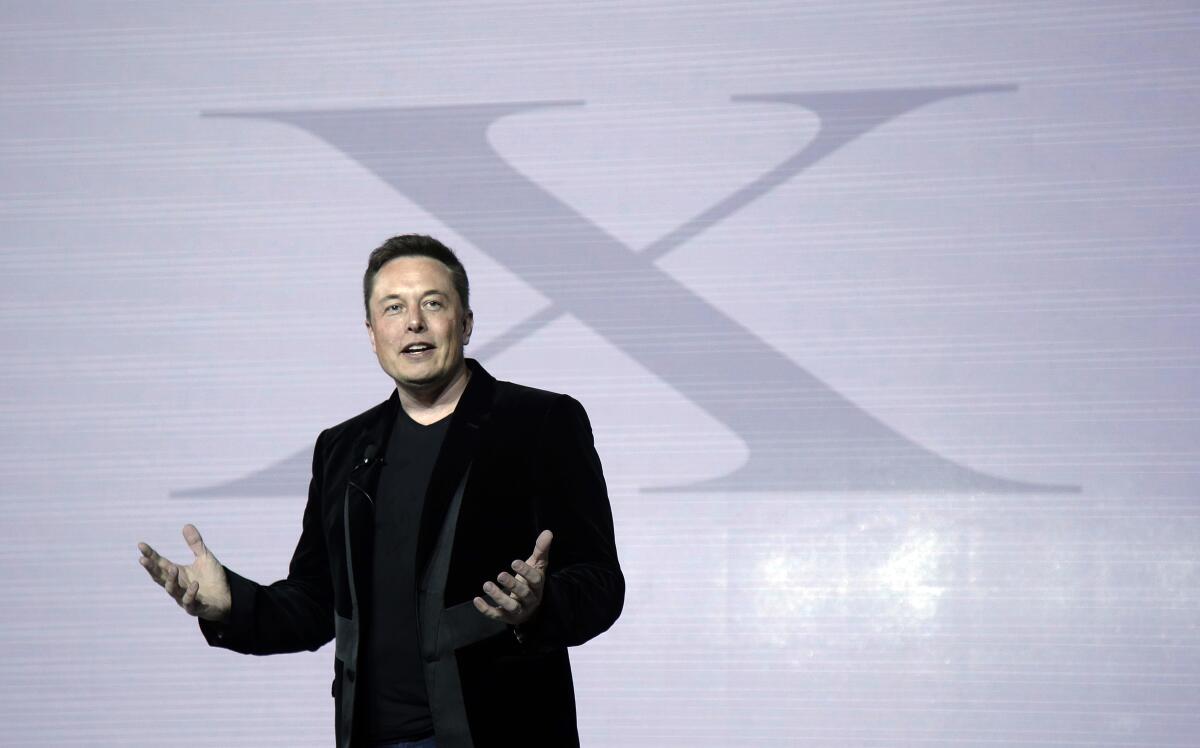Musk threatens to sue researchers who documented the rise in hateful tweets

- Share via
X, the social media platform formerly known as Twitter, has threatened to sue a group of independent researchers whose research documented an increase in hate speech on the site since it was purchased last year by Elon Musk.
An attorney representing the social media site wrote to the Center for Countering Digital Hate on July 20 threatening legal action over the nonprofit’s research into hate speech and content moderation. The letter alleged that CCDH’s research publications seem intended “to harm Twitter’s business by driving advertisers away from the platform with incendiary claims.”
Musk is a self-professed free speech absolutist who has welcomed back white supremacists and election deniers to the platform, which he renamed X earlier this month. But the billionaire has at times proven sensitive about critical speech directed at him or his companies.
The center is a nonprofit with offices in the U.S. and United Kingdom. It regularly publishes reports on hate speech, extremism or harmful behavior on social media platforms such as X, TikTok or Facebook.
Twitter’s user-friendly blue bird got replaced by a user-frightening black X, a lot like the skull-and-crossbones on cartoon bottles of poison. Fitting, right?
The organization has published several reports critical of Musk’s leadership, detailing an increase in anti-LGBTQ hate speech as well as climate misinformation since his purchase. The letter from X’s attorney cited one specific report from June that found the platform failed to remove neo-Nazi and anti-LGBTQ content from verified users that violated the platform’s rules.
In the letter, attorney Alex Spiro questioned the expertise of the researchers and accused the center of trying to harm X’s reputation. The letter also suggested, without evidence, that the center received funds from some of X’s competitors, even though the center has also published critical reports about TikTok, Facebook and other large platforms.
“CCDH intends to harm Twitter’s business by driving advertisers away from the platform with incendiary claims,” Spiro wrote, using the platform’s former name.
Imran Ahmed, the center’s founder and CEO, told the AP on Monday that his group has never received a similar response from any tech company, despite a history of studying the relationship between social media, hate speech and extremism. He said that typically, the targets of the center’s criticism have responded by defending their work or promising to address any problems that have been identified.
Ahmed said he worried X’s response to the center’s work could have a chilling effect if it frightens other researchers away from studying the platform. He said he also worried that other industries could take note of the strategy.
Musk, a self-styled “free speech absolutist,” has banned an entirely new category of speech. That he hasn’t gotten more blowback speaks to both how tired people are of seeing him and his antics take center stage.
“This is an unprecedented escalation by a social media company against independent researchers. Musk has just declared open war,” Ahmed told the Associated Press. “If Musk succeeds in silencing us other researchers will be next in line.”
Messages left with Spiro and X were not immediately returned Monday.
It’s not the first time that Musk has fired back at critics. Last year, he suspended the accounts of several journalists who covered his takeover of Twitter. Another user was permanently banned for using publicly available flight data to track Musk’s private plane; Musk had initially pledged to keep the user on the platform but later changed his mind, citing his personal safety. He also threatened to sue the user.
He initially had promised that he would allow any speech on his platform that wasn’t illegal. “I hope that even my worst critics remain on Twitter, because that is what free speech means,” Musk wrote in a tweet last year.
X’s recent threat of a lawsuit prompted concern from U.S. Rep. Adam B. Schiff (D-Burbank), who said the billionaire was trying to use the threat of legal action to punish a nonprofit group trying to hold a powerful social media platform accountable.
“Instead of attacking them, he should be attacking the increasingly disturbing content on Twitter,” Schiff said in a statement.
More to Read
Inside the business of entertainment
The Wide Shot brings you news, analysis and insights on everything from streaming wars to production — and what it all means for the future.
You may occasionally receive promotional content from the Los Angeles Times.












